Oasis of hope planted in the heart of Karachi
300 Karachiites gather under scorching sun to plant over 240 trees
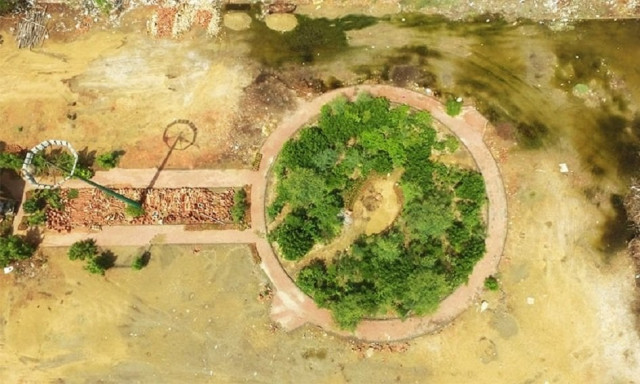
Aerial view of the Urban Forest - PHOTO COURTESY: URBAN FOREST
On Earth Day, which is celebrated every year on April 22, over 300 citizens gathered under the scorching heat to plant 240 trees that they hope would help Karachi fight heatwaves and climate change.
The event was organised by 'Urban Forest', which is a socially driven enterprise that focuses on the creation of naturally grown and self-sustaining urban forests.
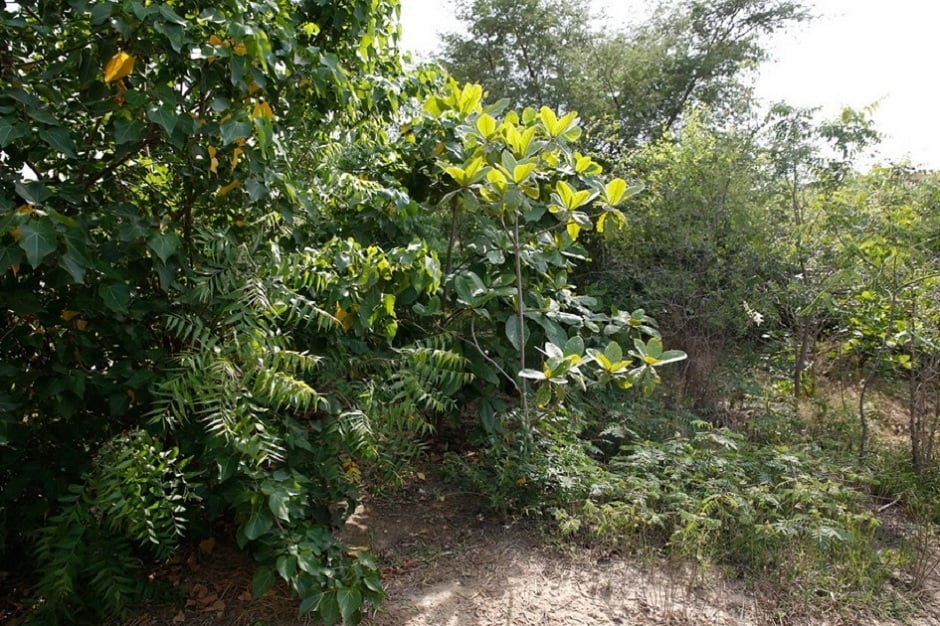 Dense tall forest of Indian Almond, Neem and Indian Tulip tree can be seen growing in the urban forest. PHOTO COURTESY: URBAN FOREST
Dense tall forest of Indian Almond, Neem and Indian Tulip tree can be seen growing in the urban forest. PHOTO COURTESY: URBAN FORESTThe man behind this very intriguing project is Shahzad Qureshi, a textile engineer-turned-ecopreneur (environmentally conscious entrepreneur) who hopes to revive a once desolate park that had been used as a dumping ground for the last 25 years, turning it into a lush green forest that is now be filled with native species of trees that have unfortunately been completely wiped out from being planted by the city's horticulturalists.
Located in the heart of Clifton's Block 5, adjacent to Neher-e-Khayyam, is the 50-year old public park that lay barren until Qureshi and his team selected it as part their pilot project called Urban Forest which was initiated back in January 2016.
Pakistan’s first urban forest reaches greater heights
The idea behind the Urban Forest was inspired largely after Qureshi watched a Ted Talk by Bangalore-based Shubhendu Sharma in 2014, who is the founder and director of Afforestt that is a similar for-profit social enterprise on a mission to bring back native forests in India.
The Urban Forest follows Dr Akira Miyawaki methodology of afforestation, which Qureshi learned from Sharma when he visited this site back in November 2015 and together they worked on the project which was thought over in the aftermath of the devastating heatwave of May, 2015 that killed over 1,200 people.
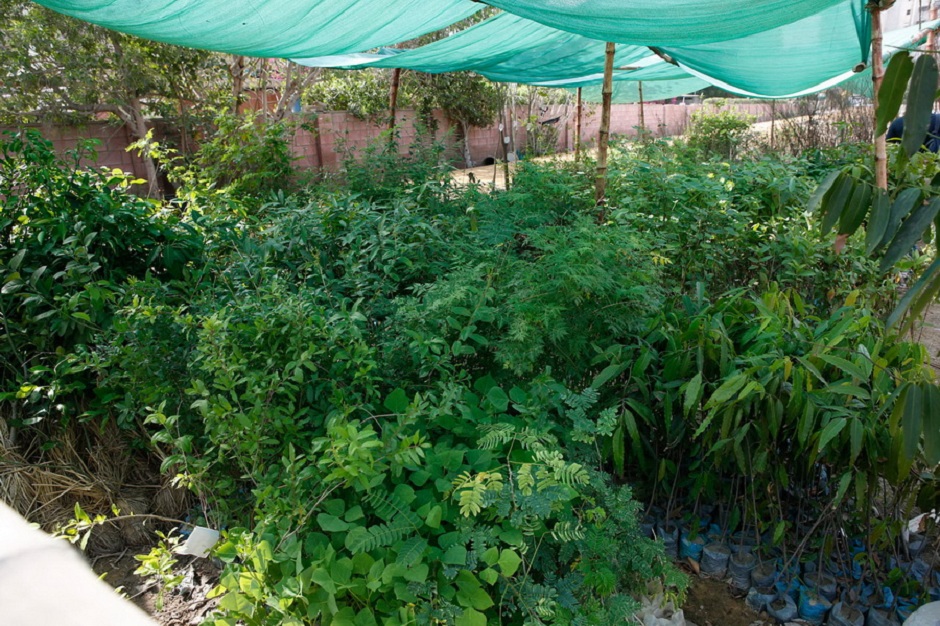 Tree nursery with many native and indigenous species ready to be planted. PHOTO COURTESY: URBAN FOREST
Tree nursery with many native and indigenous species ready to be planted. PHOTO COURTESY: URBAN FOREST"Our plan is to plant fast-growing, self-sustaining and independent forests within three years. These 'urban forests' would be then replicated across the city and planted with native species and organic biomass without the help of any fertilisers, chemicals or pesticides," Qureshi said.
Over the years the model Urban Forest spread over 400 square-metres of space has been planted with over 1,200 different varieties of trees, some of these species include moringa (Moringa oleifera), neem (Azadirachta indica), anar (Punica granatum), peepal (Ficus religiosa), Indian almond (Terminalia catappa), Indian tulip tree (Thespesia populnea) and 35 other indigenous and native species that add diversity and beauty to this newly planted forest.
Qureshi went on to say, "We wish to bring back species that have been lost from our gardens, from our public parks and from our lives simply because we no longer plant them."
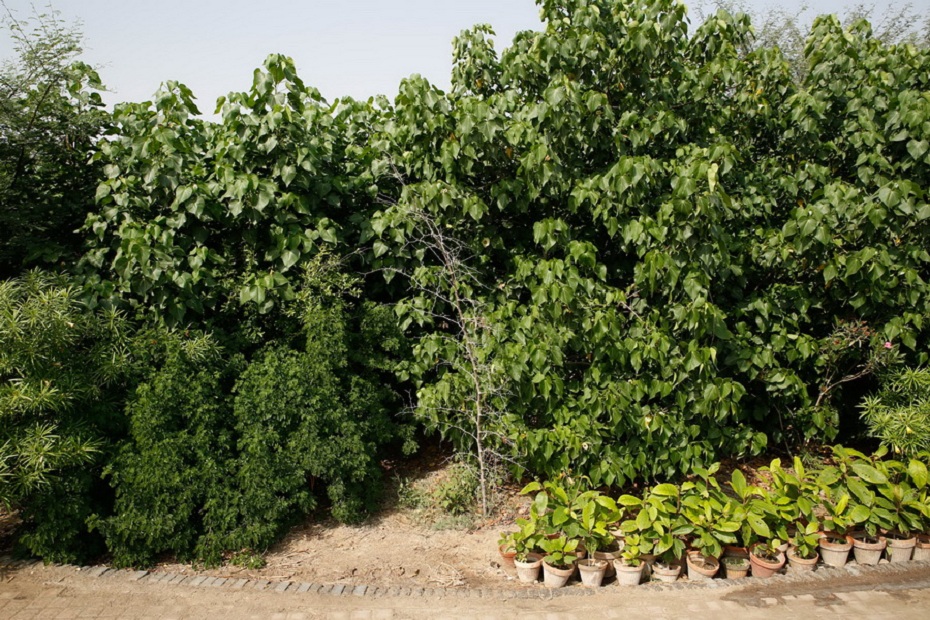 Urban forest trees are able to reach the height of around 25 feet. PHOTO COURTESY: URBAN FOREST
Urban forest trees are able to reach the height of around 25 feet. PHOTO COURTESY: URBAN FOREST"Forests are important for our environment -they regulate the climate, they provide relief from the scorching sun, reduce emotional stress and support habitat for countless species of birds, butterflies and other wildlife that we have all but lost from our urban ecosystem," he added.
Pakistan has already lost one-third of its forest cover from 1990 and 2010, according to a report published by the United Nation's Food and Agriculture Organisation.
A research paper by the Pakistan Forest Institute and Pakistan Institute of Development Economics also highlighted that every year around 39,000 hectares of forest area is cleared across the country.
A World Bank report further detected the loss of parks and green spaces with satellite imagery indicating that the city's total share of urban green space has fallen from 4.6% (27km) in 2001 to 3.7% (30km) in 2013.
The report recommended “greening” initiatives of city’s public spaces that could not only help reduce urban heat islands and excessive energy consumption but also provide breathing spaces for an increasingly dense city.
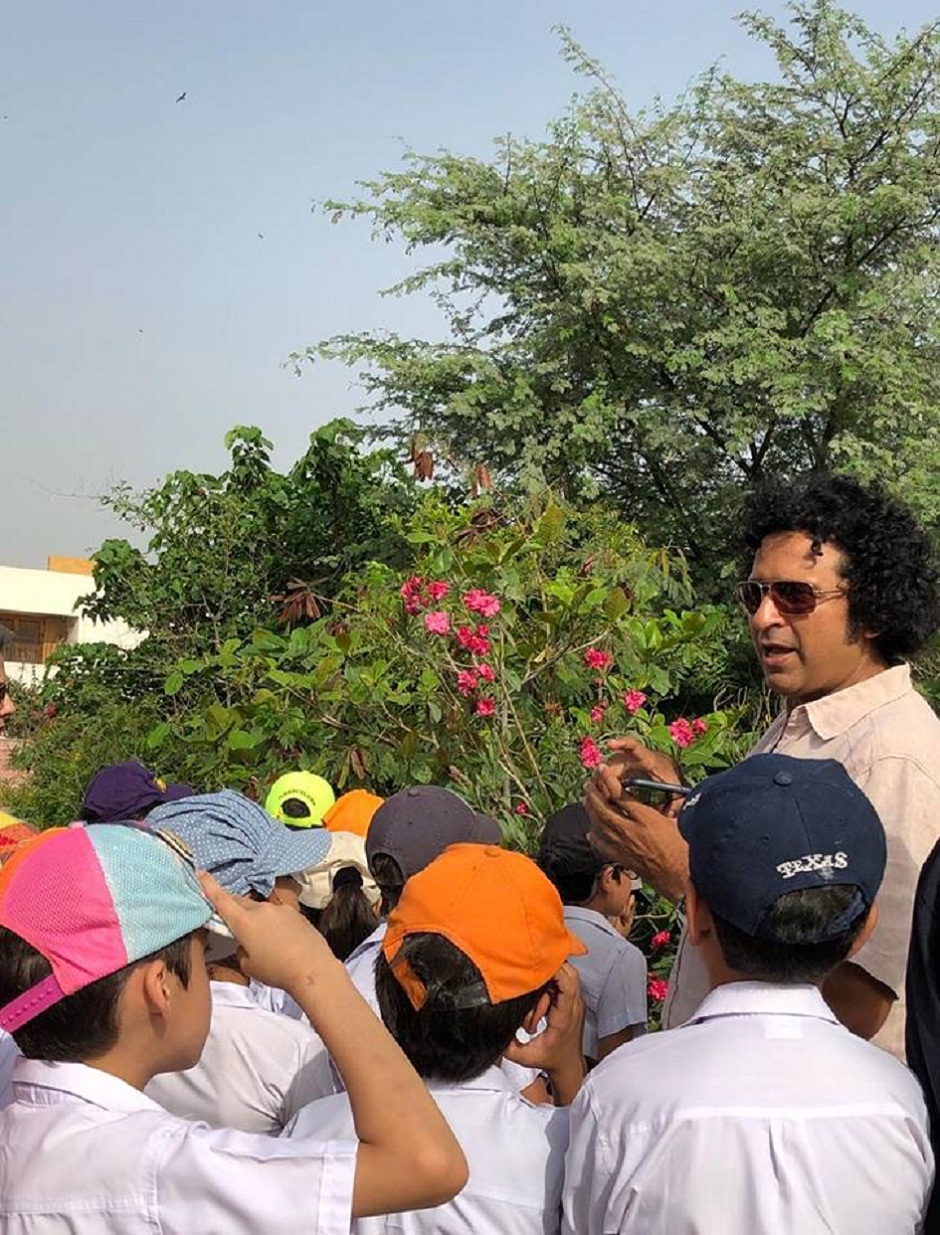 Shahzad Qureshi is giving school children a tour of the urban forest. PHOTO COURTESY: URBAN FOREST
Shahzad Qureshi is giving school children a tour of the urban forest. PHOTO COURTESY: URBAN FORESTAnam Zeb, an Islamabad-based climate researcher with extensive research on climate adaption and mitigation across Punjab and Sindh, commented on the rapid urbanisation of Karachi and effects of climate change.
"More and more people are turning towards cities for better service delivery, job opportunities and infrastructure," she said, adding, "This is true for Pakistan also, one of the most rapidly urbanising countries in the world."
According to her, concrete, cement and all the other materials used in urban construction have different thermal dynamics compared to the indigenous flora and fauna and contribute to cities being warmer, along with an increase of carbon emissions.
Pakistan’s first urban forest makes way in concrete jungle
"We have already seen deaths as a result of these heatwaves, and according to the Pakistan Meteorological Department [PMD], 2018 is to be the warmest year yet. It's not simply a question of turning up the dial on your energy-intensive air conditions to 1.5 degrees cooler if the world warms up that much," explained Zeb. "The 1.5-degree threshold agreed upon at the Paris climate agreement is an average figure, but the actual temperature anomalies are going to be much greater," she said.
"Climate change adaptation and mitigation efforts in my opinion in Pakistan have been limited to donor-funded extremely large initiatives, largely in rural areas. The real way to tackle the problem is to stop relying on these 'big' initiatives and for households to take cost-effective measures at home not only to reduce their emissions but also to promote greener living, which saves costs in the long run." advised Zeb.
Qureshi on the other hand was quite optimistic over the prospects of what is being achieved. "The Urban Forest has so far legally adopted this park and our future plans include that we develop a lush vegetable garden, a butterfly garden and a fruit farm along with a kitchen garden and all of this would be open for the local communities to farm and eat the fruits of their labour".
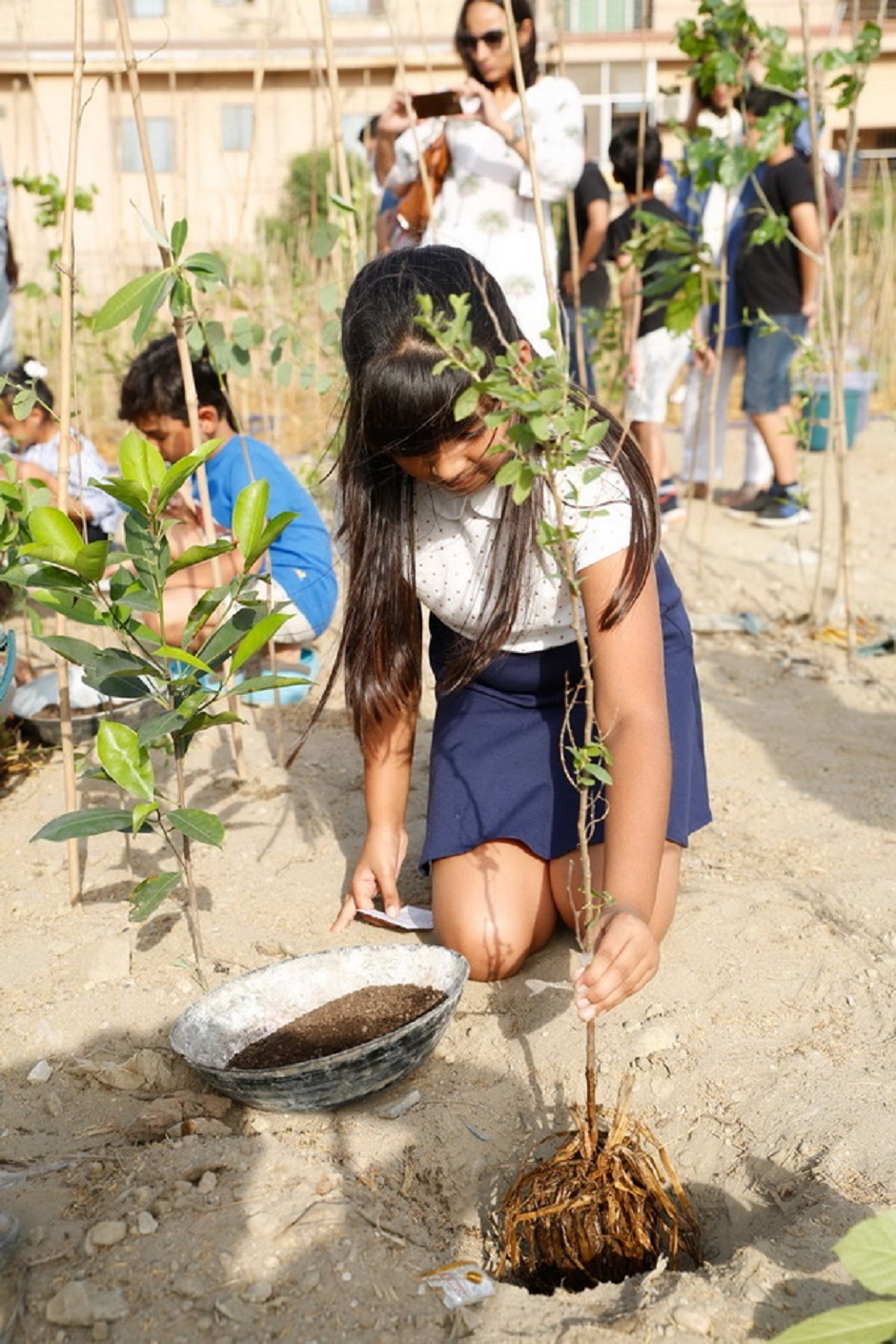
Schoolgirl plants a young sapling on Earth Day. PHOTO COURTESY: URBAN FOREST
Quratulain Hameed, a banker visiting this tree planting event with her nephews, commented that, "Environmental issues are being neglected across the board, I am here so that we can encourage our children to take action and save our ecosystems for the next generations to come."
Hameed warned that "We see our city being taken over by these atrocious conocarpus, an invasive tree species that has been aggressively planted by the local government not even taking into account that this very tree has done us more harm than any good for the environment."
Environmentalist and gardening enthusiast Tofiq Pasha Mooraj said, "As a society, we are starting to lack empathy towards environmental issues because people are now living comfortable lives and hopelessness surrounds us."
Pasha pointed out to some positive developments indicating that the "Only way our children and the next generation of Pakistan can make this country a better place is that we come together, get ourselves involved and build a community spirit towards changing things and it seems such 'groundbreaking' initiatives are able to bring such change that we only wish to see around us".


















COMMENTS
Comments are moderated and generally will be posted if they are on-topic and not abusive.
For more information, please see our Comments FAQ